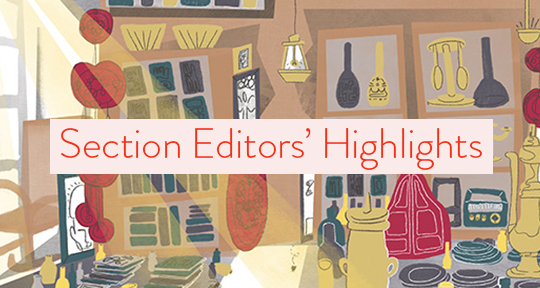This year’s events have made us all a little rusty in the art of travel, so hopping across our fortieth issue’s thirty-two countries may feel equal parts thrilling and daunting. Luckily, our section editors (including our Dutch Literature Special Feature curator, International Booker Prize co-winner Michele Hutchison) are happy to lay out a road map. Read on for literary duos on life and love in the Netherlands, a Norwegian’s popular fury, a Mexican novelist’s elusive but lasting influence, and a German author’s and Iranian poet’s exquisite study of silence.
From Lee Yew Leong, Fiction and Nonfiction Editor:
Not quite as stunningly “out there” as The Haunting of Bly Manor’s episode five, Paweł Sołtys’s deeply moving “The Kiev Sea” (translated with great aplomb by Eliza Marciniak) nevertheless reminded me of it: we are in such close third-person mode that even the reading material that the protagonist uses to while away time seems to be directly absorbed as consciousness while operating as pivotal mise en abyme. Memories and regret flit through this consciousness, “maintain(ing) the other me within the present me,” even as everything is “already slipping towards an invisible edge.” In truth—as we follow the protagonist down the rabbit hole of nostalgia—the slippage began much earlier: “it seemed that since he’d turned forty, he could only discard things. Friends, women, memories even.” What is the sum of life then? How much can we hold on to? On this fateful October day of reckoning, this fictional protagonist is reminded, via fiction, as we all are perhaps, of how removed and frightfully impersonal existence finally is: “It really happened, all of it, but it’s as if it were a story, told not to me but to someone nearby, in the noise of a bar or during a fight, a proper one, when the sound of the blows drowns out the wailing.”
From Michele Hutchison, Guest Editor of Dutch Literature Special Feature:
Good fortune would have it that I was working on the selection of Asymptote’s Dutch special when my translation of The Discomfort of Evening by Marieke Lucas Rijneveld was awarded the International Booker Prize. Perfect timing for sharing these stunning new Dutch voices with you, coinciding with the spike in interest in our national literature. (I wrote ‘our’ without thinking: I’m a defected Brit, resident in Amsterdam.)
To be honest, Dutch literature has long had plenty to offer, and there have been other recent successes. Think of Gerbrand Bakker’s The Twin (translated by David Colmer) winning the IMPAC Dublin Literary Award ten years ago, and think of the great reception Gerard Reve’s classic The Evenings (translated by Sam Garrett) and Tonke Dragt’s The Letter for the King (translated by Laura Watkinson, recently a Netflix series) have had in English. We haven’t exactly been hiding our light under a bushel. Nevertheless, it was wonderful to put together this selection of Dutch talent to entice you to read further. READ MORE…




